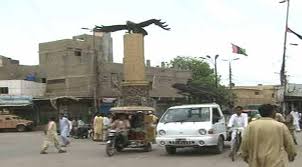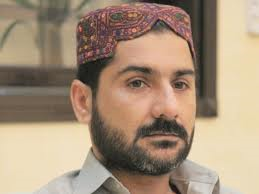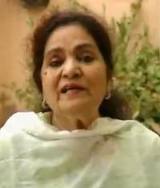Some of the most popular dramas she wrote that gained international repute include
Ankahi,
Tanhaiyaan, Kiran Kahani,
Dhoop Kinaray, Aahat, Uncle Urfi,
Shehzori, Kohar, Des Pardes, Pal Do Pal, Aansoo, Kasak, Parchaiyan and Parosi. Other notable works include Mere Dard ko Jo Zuban Milay, Kaisa Yeh Junoon, Dhundle Raaste, Shayad ke Bahar Aaye, Mohim Joo, Tum Se Mil Kar,
Bandish and Zer Zabar Paish. It appears strange that with such a success following even greater success on the TV screen, Moin didn’t branch out into other literary forms like novels or short stories which are such a popular genre among Urdu fiction writers
Early life
A native of
Kanpur, the most populous city in the northern Indian state of
Uttar Pradesh, Haseena Moin received her early education in her ancestral region and, after the
partition of India, migrated with her family to Pakistan. She lived for a number of years in
Rawalpindi, then moved to
Lahore and, in the 1950s, settled in
Karachi, where she graduated from the
Government College for Women in 1960 and earned
Master of Arts in History from
Karachi University in 1963. Her yearn for writing was visible right from the time she was in final years of her schooling, as from 7th standard, beside other school activities she got selected to write weekly column by the title of BHAI JAN for a local journal.
[5][6]Her fame started laying its foundation when she regularly wrote some memorable plays for Radio Pakistan Karachi’s all time popular “Studio Number 9. Professionally, she took up the educational pursuits and start teaching. She rose to the level of Principal. It was in 1969 that Iftikhar Arif, Head of the Script Dept. at
PTV-Karachi Centre, called Hasina and offered her to write a play for the then-forthcoming EID. Initially Hasina was nervous, but took courage to pen down a play. The cast was also decided by her with Kunwar Aftab Ahmed as the director. Hence came
Eid Ka Jorra with Neelofer Aleem and Shakil in lead, supported by Khalid Nizami and Ishrat Hashmi.
[7][8]Career
In Pakistan Television Industry
She has penned down many successful and most famous plays of PTV like
Shehzori,
Zeir Zabr Peish,
Uncle Urfi,
Unkahi,
Tanhaiyaan,
Parchaieyen,
Bandish,
Dhund,
Dhoop Kinarey,
Aahat,
Kasak,
Pal Do Pal and
Tere Ajane Se. Her play
Gurya which was directed by
Shirin Khan with cast members
Manzoor Qureshi,
Shahla Ahmad Bina of
Uncle Urfi,
Azra Sherwani and
Raju Jamil, won an award at the Global TV Plays Festival in Tokyo for best script and direction. She was the writer of the first coloured drama of Pakistan, aired on PTV called
Parchaiyan, which had a huge star cast and was directed by
Mohsin Ali.
[9]She has also written Pakistan’s first original script ‘Kiran Kahani’ aired in early 70’s. Before this PTV used to rely on novel based scripts. Most of the people at that time were not confident with the experiment but it was Mohsin Ali who encouraged her to write and finally when the play was on air, it was a huge success and is remembered to date. It starred Roohi Bano in the lead with Manzoor Qureshi, Begum Khursheed Mirza,
Qazi Wajid and many more.
[10][11]In Indian Television Industry
Her drama serial
Dhoop Kinare, which aired in 1987 and was famous in Pakistan as well as India, is remembered by many people in India by the name of
Kuch Toh Log Kahenge. It was re-written by popular Indian writer Kamlesh Pandey, who stated that by remaking this play he has paid tribute to Hasina Moin.
[12][13] She wrote a play for India called
Tanha, which become widely popular during its run. She also wrote a play for Doordarshan called ‘Kashmakash’, Arshad Mahmood composed and Tina Sani sang the title song of the play.
[14]Films
Lollywood
Moin wrote the script for the 1978 film
Yahan Se Wahan Tak, starring
Waheed Murad. The film was produced and directed by
Syed Kamal. She also wrote the dialogues for the 1986 film
Nazdekiyan which was directed by
Usman Peerzada, starring
Samina Peerzada and Usman Peerzada. The film was acclaimed and won prestigious national awards.
[15]In 1998, Moin wrote
Kahin Pyar Na Ho Jaye. The film was directed by
Javed Sheikh and the cast included
Resham,
Shaan and
Saleem Sheikh. Before release, the film was heavily hyped and was expected to be a success but eventually could not perform well at the box office.
[16][17]Bollywood
Moin was the first Pakistani writer to write for a
Bollywood film.
Raj Kapoor wanted her to write the dialogues for his dream project
Henna, which was released in 1991. He also wanted to cast
Shehnaz Sheikh in the title role of the film but after she refused, Haseena Moin recommended
Zeba Bakhtiar as the leading lady, thus Zeba was casted in the title role of Henna.
[18][19] The film was a box office success and was also chosen as India’s entry for the
Best Foreign Language Film at the
Oscars.
[20][21]Initially she was hesitant to write for a Bollywood film. During the pre production stages Raj Kapoor passed away and the project was taken over by his son
Randhir Kapoor. But when the film was about to release the
Babri Mosque incident broke out and Moin wrote a letter to Randhir Kapoor in which she requested that her name should not be used to promote the film neither her name should be mentioned in the credits as it may hurt her fans in Pakistan, thus her name was not mentioned in the credits nor the film was promoted using her name but she was acknowledged at the end of the film. Although this incident brought a lot of loss to her but she stated in an interview that
she can do any thing for her country and sacrificing a film was very little thing for her she could also give her life for her country.
[22][23]Genres
She has written every type of drama. From comedies like
Shehzori,
Uncle Urfi,
Tanhaiyaan with best comic characters in her plays, like Mamoo, Timmy and Moby in
Ankahi. Qabacha, Bukrad and Aapa Begum in
Tanhaiyan, Gazi Apa in
Uncle Urfi to tragedies like
Parchaiyaan. From romantic dramas like
Dhoop Kinaray,
Ankahi,
Kohar to family dramas like
Aansoo. She has also written several plays based on social issues like the super hit Aahat, it was based on family planning and was directed by Sahira Kazmi, her play Des Pardes was based on the lives of people living Scotland and the problems they have to face. Chup Darya a telefilm starring Sania Saeed was based on Karachi’s conditions and Shayad ke Bahar Aye was based on Women rights. She has also written historic plays like Tansen, Meray Dard ko jo Zuban Mile and the recent Anjaane Nagar. Her other plays include Parosi, Pal do Pal, Kasak based on the life of a single parent, Dhundle Raaste and many more.
[24][25]Recurring collaborators
Directors
Many of Haseena’s plays have been directed by (late) Mohsin Ali. Starting from Hasina’s first play Shehzori to Mohsin’s last play Ik Naye Morr Pe, they have worked together in more than 10 plays. Other directors with whom Haseena has repeatedly work include Shoaib Mansoor (his debut play Ankahi and the long play Dhundle Raaste), Sahira Kazmi (she directed Hasina’s two blockbuster plays Dhoop Kinare and Aahat and she directed her first play Choti Choti Baatein which was also written by Hasina, Sahira also acted in Haseena’s Parchaiyan, M Zaheer Khan (he directed several episodes of Zer Zabar Pesh, he also directed Kohar, Aania and the remake of Kiran Kahani, Shirin Khan directed some early plays of Haseena which include the all time famous Uncle Urfi, Zer Zabar Pesh, Kiran Kahani and Gurya, Raana Sheikh (she directed Parosi, Shayad ke Bahar Aye and Kaisa Yeh Junoon), Ali Rizvi (he directed the famous Aansoo and Des Pardes as well as Meray Dard Ko Jo Zuban Mile).
[26]Actors and Actresses
Many actors and actresses have appeared in her plays frequently such as Qazi Wajid, Shakeel, Rahat Kazmi, Talat Hussain, Jamshed Ansari, Behroze Sabzwari, Asif Raza Mir, Neelofar Aleem, Roohi Bano, Shehnaz Sheikh (she has only done two plays in her career and both were by Haseena Moin and both were blockbusters), Marina Khan, Zeba Bakhtiar, Nadia Khan, Nadia Jamil, Sania Saeed, Badar Khalil (she worked in all the blockbuster plays of Hasina such as Ankahi, Tanhaiyan, Dhoop Kinare and Parosi), Azra Sherwani, Begum Kursheed Mirza, Ishrat Hashmi and Khalida Riyasat all have repeatedly worked with her in two plays or more.
Recent work
Her drama serial
Saare Mausam Apne Hain aired on Geo Tv in late 2012. The drama was directed by Ali Rizvi.
[27]Also
Meri Behan Maya another play by Moin began aired from 17 September 2012 to 11 January 2013 on Geo TV. It was directed by Azfer Ali. The audience appreciated the story and the love shown between the sisters was immensely liked. Annie Jafry was also appreciated for her performance as Maya.
[28]In 2012, sequel is made of one of her most famous dramas
Tanhaiyan aired in 1985. A sequel
Tanhaiyan Naye Silsilay which was aired from October 20, 2012 to January 19, 2013 on
PTV and
ARY Digital simultaneously. Moin wrote the first 7 episodes and had to go abroad, so she allowed Mohammad Ahmed to write the rest of the episodes, and she would write the last episode when she returned, but, by the time she returned the entire serial was written and many changes were made to the episodes she had written. She was very disappointed so she asked the producers to remove her name from the serial but due to copyright issues her name could not be removed. But she has said she had nothing to do with
Naye Silsilay and was very disappointed by the outcome.
[29] [30]A serial titled “Anjaane Nagar” is airing from TV ONE currently. It is a period play set in 1939 and is shot at beautiful locations in
Murree and the Northern Areas. It is directed by veteran director Khawaja Najam ul Hassan.
[31]She is also writing a mega play for Express Entertainment. The project head will be Iqbal Ansari. The play is still in its production stages and will go on air in a few months.
Awards and achievements
Haseena has visited many countries and won numerous awards, including the
Pride of Performance Award in 1987 for her services to the performing arts in Pakistan it is one of the highest civil awards conferred by the Pakistan Government. She has won many other awards including the Woman of the year award. In 1975 she also won an award at the Global TV Plays Festival in Tokyo for best script and direction for her play Gurya. She has won accolades at nearly every year’s Lux Style Awards as well as
PTV Awards, during the late 80’s Moin Akhtar gave a tribute to her at PTV awards ceremony. She has also appeared in many talk shows such as Anwar Maqsood’s LG TV SHOW and Marina Mornings and many other numerous morning shows and chat shows. Most recently she appeared in The Big Show on CNBC alongside another legendary writer
Fatima Surayya Bajia.
[32][33]In 1982 she was given a tribute by Anwar Maqsood in his show. Legendary actors and directors like Shakeel, Jamshed Ansari, Javed Sheikh, Mohsin Ali, Shoaib Mansoor, Mahmood Masood, Saleem Nasir, Behroze Sabzwari, Shehnaz Sheikh, Begum Khursheed Mirza, Badar Khalil, Neelofar Aleem were present to acknowledge her efforts. In November 2012 she was given a tribute by Karachi Arts Council called ‘Aitraaf e Kamal – Haseena Moin’. Many people like Fatima Surayya Bajia, Sahira Kazmi, Sakina Samoo, Sajid Hassan, Iqbal Ansari were present to acknowledge her immense contribution to Pakistani dramas for the last four decades.
Politics
Haseena Moin was also seen endorsing Pakistan Tehreek e Insaaf during the 2013 elections alongside Hina Khawaja Bayat, Humayun Saeed, Ayesha Omer, Rubina Ashraf and others..
[4]
 Shoaib Mohammad (Urdu: شعیب محمد) (born January 8, 1961, Karachi, Sindh) is a former Pakistani cricketer who played in 45 Tests and 63 ODIs from 1983 to 1995.
Shoaib Mohammad (Urdu: شعیب محمد) (born January 8, 1961, Karachi, Sindh) is a former Pakistani cricketer who played in 45 Tests and 63 ODIs from 1983 to 1995. Shoaib Mohammad (Urdu: شعیب محمد) (born January 8, 1961, Karachi, Sindh) is a former Pakistani cricketer who played in 45 Tests and 63 ODIs from 1983 to 1995.
Shoaib Mohammad (Urdu: شعیب محمد) (born January 8, 1961, Karachi, Sindh) is a former Pakistani cricketer who played in 45 Tests and 63 ODIs from 1983 to 1995.









